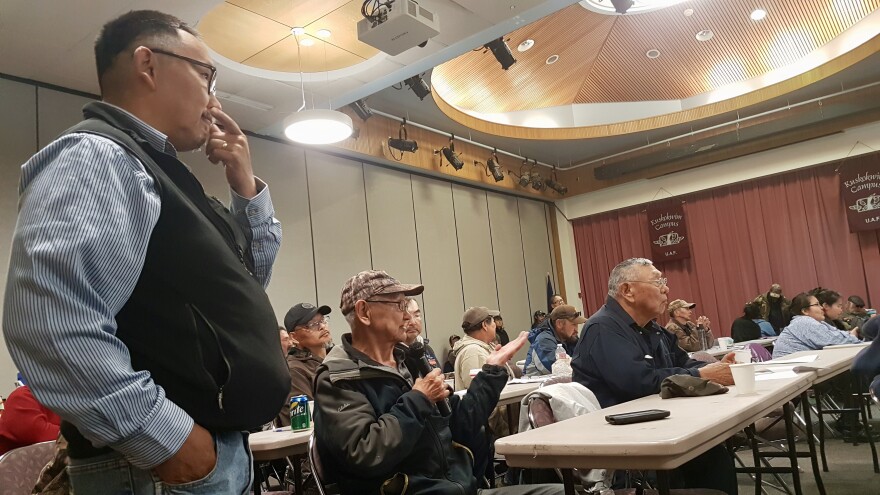On day two of the Nunavut Alaska Constitutional Convention, village representatives from across the Yukon-Kuskokwim Delta selected their officials to move through the development of a treaty. One oversight: not having a Yugtun/English translator present.
On Wednesday, after voting Chariton Epchook in to replace Ivan Ivan as chairman of the meeting and Former Bethel City Council member Nikki Hoffman in as meeting Secretary, discussion began on self-government structure. One qualification for executives in such a government: the ability to speak Yugtun, the Yup’ik language.
Throughout most of the meeting attendees spoke in Yugtun, self-translating into English on occasion. However, some in attendance, like one woman from upriver in Chuathbaluk, struggled through a good portion of the last two days, trying to keep up without a designated translator present.
“I really respect the Yup’ik language, though I’ve been sitting here half of the time not knowing what’s being said. So, I have to go back and report to the council in the Native Village of Chuathbaluk not really knowing, and doing my best to understand what changes are being proposed,” said the woman.
With her voice wavering at times, she said that it was with some disappointment that weather conditions meant she’d most likely have to leave Thursday and report back to Chuathbaluk with what she was able to understand.
Yes, others agreed that the language barrier was a problem.
“It was mostly conducted in Yup’ik, and you know for the Athabaskan folks that were here that was a real disadvantage for them,” said Mary Peltola of Bethel, “or younger people that may not understand Yup’ik. That was a bit of a disadvantage.”
Peltola is hopeful, she said, that next time they will have a translator present. But Peltola also pointed out that in Yungtun, elders were better able to get their point across.
“I think that for the older participants it was an advantage,” said Peltola, “because they could really speak from their heart about things that mattered to them. So I think it was a good, productive day.”
The concern from upriver drew a response from Harold Napoleon, one of those who called for the convention. He said that perhaps a requirement that elected executives be conversant in Yugtun was a tall order, but he added that had tribal self-determination been in place earlier, perhaps it would not be so necessary to struggle to hold onto the region's language.
The meeting continues throughout today from 9 a.m. to 5 p.m., open to the public at the Bethel Cultural Center.
SaveSave
SaveSave


